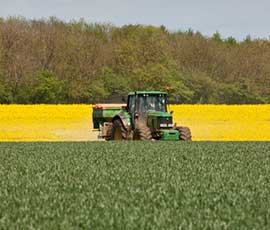Copper fertiliser could help cut greenhouse gases

Arable growers may be able to cut emissions of the greenhouse gas nitrous oxide by adding copper to their fertilisers.
New research from the University of East Anglia shows that copper helps regulate the enzyme in soil bacteria which uses nitrates from fertilisers.
This enzyme is responsible for the destruction of nitrous oxide, and if the enzyme is not fully working then the greenhouse gas is emitted into the atmosphere.
“When copper is limited, the enzyme is switched off to the destruction of nitrous oxide,” says lead research David Richardson.
Under normal conditions this nitrous oxide is transformed to harmless nitrogen, which makes up 79% of the atmosphere, but where copper is limiting this step is not completed.
Professor Richardson of the university’s school of biological sciences adds this process of denitrification occurs when nitrate levels are high and oxygen levels are low as in anaerobic soils.
He says about 20-40% of European soils could be deficient in copper, and four years of European Union funding is now available to look into copper deficient soils and nitrous oxide emissions.
Global farming emissions of nitrous oxide have risen by 20% in the past century as a result of the widespread use of nitrogen-based synthetic fertilisers.
These emissions are continuing to rise and the researchers warn that molecule for molecule nitrous oxide’s potential to cause global warming is 300 times more than carbon dioxide.
The work, funded by the Biotechnology and Biological Sciences Research Council (BBSRC), suggests that growers can control these emissions by the use of copper fertilisers, which are already available for use on copper-deficient soils.
The next stage of the research is to conduct field trials to compare nitrous oxide emissions for soils that are naturally high in copper and those that are naturally low.
This will be part of a four-year €5m (£4.1m) EU-funded study into nitrous oxide production and consumption in bacteria by the European Nitrous Oxide Research Alliance (NORA) grouping, of which the University of East Anglia is a member.
The paper entitled Copper control of bacterial nitrous oxide emission and its impact on vitamin B12 dependent metabolism by Matthew John Sullivan, Andrew J Gates, Corinne Appia-Ayme, Gary Rowley and David J Richardson is published in the journal Proceedings of the National Academy of Sciences.

